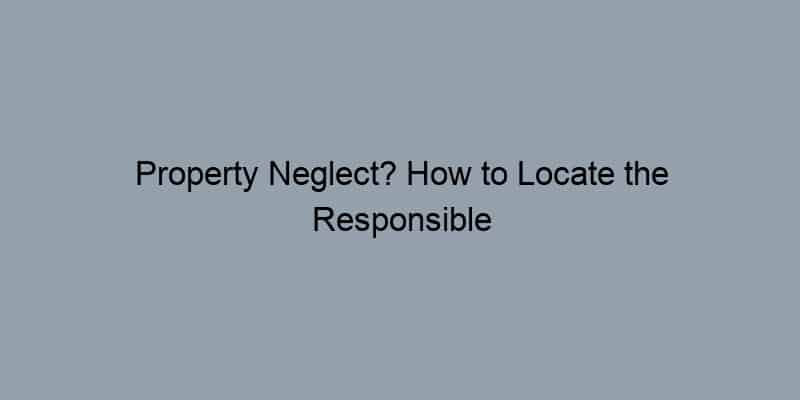Have you ever stumbled upon a neglected property in your neighborhood, overrun by weeds and decay, and wondered who owns it? You’re not alone! Property neglect is a common issue that affects communities worldwide, leading to diminished property values, safety concerns, and aesthetic eyesores. But fear not; if you’ve ever found yourself facing a neglected property, this guide will empower you to locate the responsible owner and promote community revitalization.
What Is Property Neglect?
Property neglect occurs when an owner fails to maintain their property, leading to a decline in its condition. This can manifest in various forms, including:
- Overgrown lawns
- Broken windows
- Falling paint
- Pests and vermin
Beyond just being unsightly, neglected properties can also attract crime and serve as hotspots for illegal activities. Local authorities may need to intervene, putting a spotlight on the property owner. However, finding those responsible can be a complex task.
Why Finding the Responsible Owner Matters
Understanding who owns a neglected property can be crucial for several reasons:
-
Legal Responsibility: Owners are typically responsible for keeping their property up to code. Understanding ownership helps you advocate for maintenance or enforcement.
-
Community Involvement: Knowing the owner allows you to rally your community together to address the issue. Often, people are more motivated when they see collective action.
-
Potential Opportunities: Discovering the owner may open up avenues for communication about possible sales, renovations, or community collaborations.
Steps to Locate the Responsible Owner
Finding the owner of a neglected property can seem daunting, but with a few simple steps, you can gather the information you need:
1. Check Local property records
Local property records are your best friend in this endeavor. Most jurisdictions maintain a public database of property ownership. You can usually access these records through your county assessor’s office or online property databases.
2. Visit the Local Tax Assessor’s Office
The tax assessor’s office can provide information on property ownership and tax status. If property taxes are delinquent, it may indicate that the owner is not maintaining the property.
3. Utilize Online Tools
If you’re looking for a more straightforward approach, websites like OfficialPropertyRecords.org offer access to free property records. Simply enter the property’s address, and you’ll be provided with ownership details and potentially more information about the property’s history.
4. Talk to Neighbors
Sometimes, your neighbors hold the key to locating the owner. They may have insights into who owns the property or even what past attempts have been made to address the neglect.
5. Consult Local Government Agencies
Local government offices can provide valuable information regarding any complaints or violations associated with the property. This can lead you to the responsible party or at least illuminate the steps that need to be taken.
6. Search Online Public Records
Many local governments have transitioned to digital records; a quick online search can often yield the owner’s name and contact information. Make sure to follow up by calling or writing to the owner.
7. Hire a Professional Service
If DIY efforts don’t yield results, consider hiring a property investigator. While this may involve a fee, it can save you time and frustration.
FAQs About Property Neglect and Finding Owners
Q: Are neglected properties considered a legal issue?
A: Yes, neglected properties can violate local ordinances, leading to fines or legal action by municipalities.
Q: What should I do if I find a code violation?
A: Report the violation to your local city or county code enforcement office. They will often send a notice to the owner.
Q: How can I organize my community to address property neglect?
A: Start by holding a neighborhood meeting to raise awareness about the issue. Create a team to reach out to owners and involve local authorities as needed.
Q: Can I be held liable if I interfere with a neglected property?
A: Avoid any actions that could be seen as trespassing or property damage. Engaging through official channels is the best approach.
Q: What if the property is owned by a corporation instead of an individual?
A: Corporate ownership can complicate matters, but the same principles apply. Use public records to find out the corporation’s contact details.
Q: Does property neglect affect my property value?
A: Yes, neglected properties can decrease nearby property values and make neighborhoods less desirable.
Conclusion
Dealing with property neglect can feel overwhelming, but by following the steps outlined above, you can take proactive measures to identify the responsible owner. Remember, addressing issues of neglect not only enhances community aesthetics but can also boost property values and safety.
If you’re ready to dive deeper into the ownership details of a neglected property in your area, I highly recommend using OfficialPropertyRecords.org to access free property records. Armed with this information, you can take the next steps to revitalize your community and ensure that all properties contribute positively to the neighborhood! Don’t let neglect fester; take action today!

